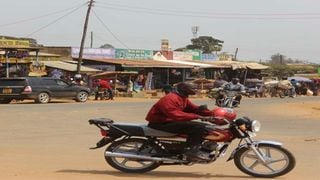
Chwele trading centre in Bungoma County on January 27, 2015. The centre has no bank.
|Chwele, the rich Bungoma town still begging for a bank
Chwele town in Kabuchai constituency in Bungoma County is a rich town by many standards.
It is home to what is billed as Kenya’s second largest open-air market, only rivalled in size and volume of goods by the Karatina market in Nyeri.
Comparative statistics from the county and the business community show that the market has an annual turnover of at least Sh13 billion, with the value of goods and services estimated at over Sh280 million monthly.
But despite this apparent wealth, the town, about 24km north of Bungoma town, has no single bank.
For the area’s traders, residents, business operators and tens of government officials, including police and county officials, transactions involving large amounts of cash give them sleepless nights.
They must travel to neighbouring Kimilili and Bungoma towns for banking services.
Besides the lack of banks, the town also has no large supermarket, denying residents the convenience of one-stop shopping.
Chwele’s location on the volcanic soils of Mt Elgon places it at the centre of a production chain that serves buyers from neighbouring Uganda and towns like Eldoret, Kitale, and Kisumu.
But traders say the lack of a bank — which forces them to carry around large amounts of cash — and proper planning to take advantage of the town’s massive opportunity is keeping away potential investors.
"We have had cases where the terrible Kabuchai Defense Forces, 42 Brothers, the Sabaot Land Defense Force from Mt Elgon and other marauding gangs from Uganda would attack shops and traders while armed with guns and loot from them at night," said Mr Ben Wangila, the chairman of the business community.
Though police have intensified patrols and reduced criminal activities, he said, the need for a bank is still as urgent as ever.
“The amount of money and volume of commodities exchanged at the Chwele market are enormous and the need for a bank is self-evident,” he said.

A man transports bunches of bananas along Chwele-Bungoma highway on June 17, 2020.
A study by the county shows that traders at the open-air market exchange thousands of tonnes of cereals (480), legumes (350) root crops (60), oil crops (30), vegetables (1,800), fruits (190) and livestock (1,450) each week.
These figures, Mr Wangila said, are likely once the economy is fully reopened.
He estimated that the market has the potential to increase the value of goods and services sold each year to a staggering Sh24 billion, with the county standing to rake in as much as Sh800 million in revenue.But there is a problem.
The town with no bank or supermarket also lacks basic amenities to trigger that level of trade.
"The town has no physical planning, with a poor drainage system and poorly maintained roads. Instead of an auction site with physical structures, we just have an open field," Mr Wangila said.
The main slaughterhouse at the open-air market is a disgrace, he said.
There are no street lights in the town either, he lamented.
Piped water has also remained a pipe dream, with residents used to dry taps.
A 2019 study of Chwele and its boundaries by the national government recommended that the town be replanned, and that basic services and amenities be adequately provided with supporting infrastructure.
The study also said that more land should be allocated for public amenities, including a stadium, a cemetery and recreational places.
Of the 32 services required in the town, the study showed, only 15 were available.
Those missing included postal and banking services, street lights, a sewer line, a waste disposal site, a fire station, housing for police officers, cemeteries or crematoriums, a library and animal control and welfare.
Managers of the newly refurbished Chwele chicken slaughterhouse complained recently that they don’t have enough birds to slaughter.
Shiffa Chicks Limited said it was struggling to meet its demand of 5,000 birds per day, and urged residents to increase the number of chickens they rear to keep the processing plant running.





